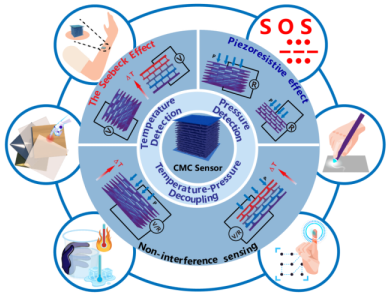Recently, Professor Xiaofeng Li's research team at the College of Materials Science and Engineering, Beijing University of Chemical Technology, published a research paper titled 《High-Performance Bimodal Temperature/Pressure Tactile Sensor Based on Lamellar CNT/MXene/Cellulose Nanofibers Aerogel with Enhanced Multifunctionality”》.

The rapid development of thermoelectric-piezoresistive dual-mode sensorshas opened new avenues for enhancing the functionality, miniaturization,and integration of flexible tactile sensors. However, existing researchprimarily focuses on decoupling temperature and pressure responses, whichleaves a significant gap in optimizing sensor performance and exploringmultifunctional applications. To address this limitation, a composite aerogelwith a layered porous structure is developed, integrating carbon nanotubesand MXene as conductive materials and reinforced with cellulose nanofibers.The innovative design, characterized by ultra-low thermal conductivity alongwith superior electrical and thermoelectric properties, allows the resultingsensor to monitor temperature and pressure stimuli without interferencethrough thermoelectric and piezoresistive mechanisms. Demonstratedresults reveal exceptional sensing capabilities, including a minimumdetectable temperature variation of 0.03 K and a pressure detection limitof 0.3 Pa. The sensor exhibits high sensitivities of 33.5 μV K−1 and −45.2%kPa−1 , along with stability across both temperature and pressure stimuli.Furthermore, the unique multi-modal sensing mechanism supports variousapplications, such as thermoelectric energy harvesting, material recognition,complex information transmission, smart wearable devices, electronic skin,and human-computer interaction interfaces. This research presents a robustsolution for designing high-performance dual-modal tactile sensors andsignificantly advances their practical applications across multiple domains.
https://doi.org/10.1002/adfm.202418988


